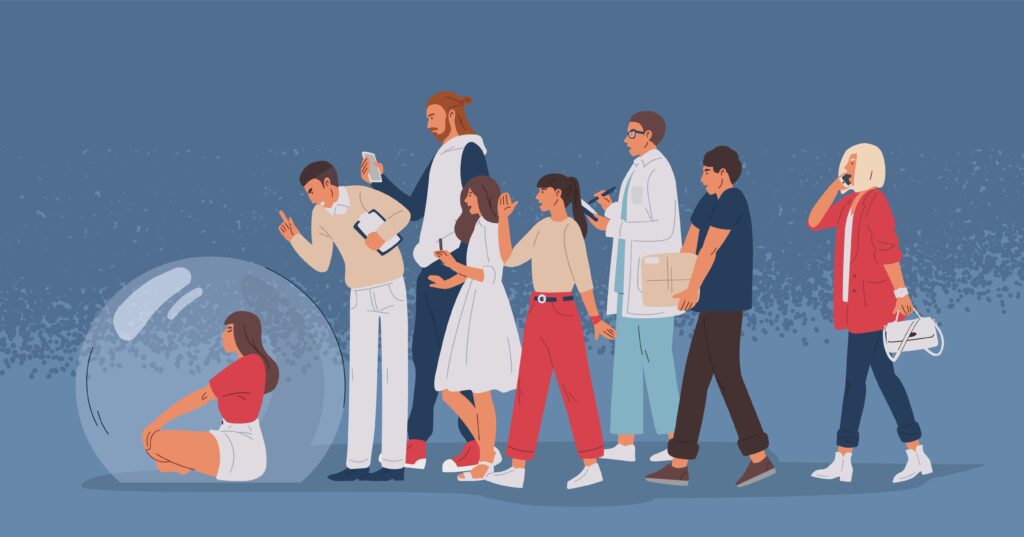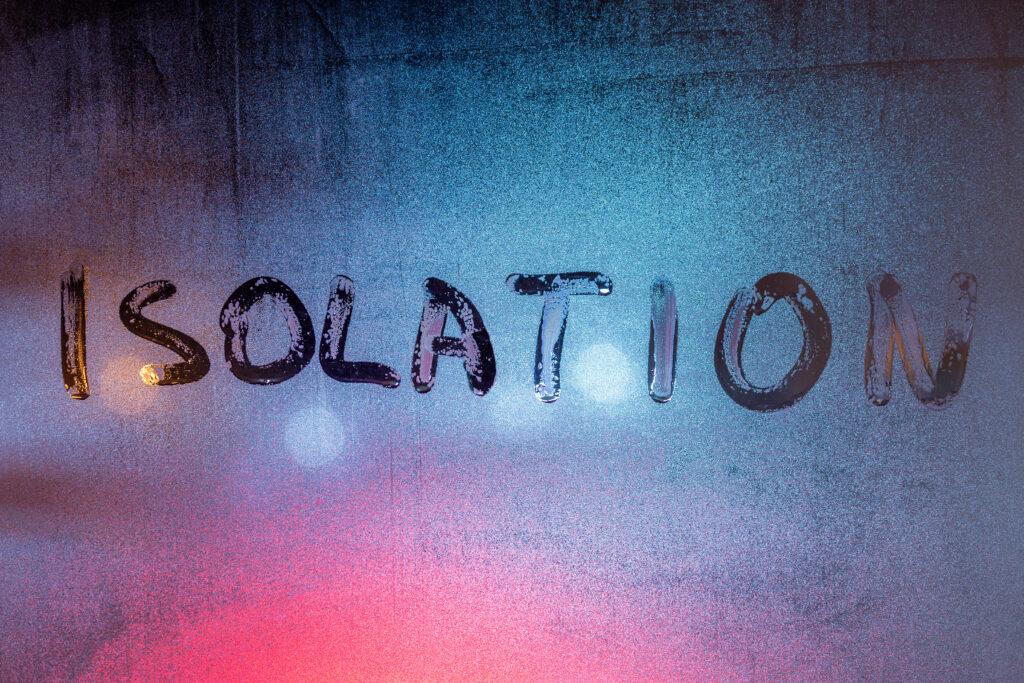Loneliness, Are you alone, lonely, or socially withdrawing/isolating?
While humans are social beings who love to experience a sense of belonging and connection to others, they aim to fulfil their potentials and be their authentic selves as well. All individuals need to be alone from time to time, to observe their experience without social constrictions, to know themselves without relating to others.
Once you are alone you can pay attention to who you are, become aware of certain traits or thoughts that you rarely express in front of others, or just enjoy things and activities without thinking if you’re bothering someone. Freedom, creativity, intimacy, and spirituality are all found to be the benefits of being alone (Long and Averill, 2003).

However, being alone can still, in many cases, be far from healthy and social, so there are other aspects to consider. If you are spending much of your time alone lately, there are some questions you may want to ask yourself:
- Did I choose to be alone?
- Am I avoiding something or someone?
- Am I having a good time by myself?
- Have I done something that brought me fulfilment?
- Do I think that others do not like me?
- Do I feel as if I don’t have real friends?
- Do I think that I will want to hang out with someone soon?
Solitude – “A social phenomenon”
Believe it or not, solitude is considered “a social phenomenon” by many psychologists (Long and Averill, 2003). By observing historical figures, spiritual individuals, writers, painters and many others who preferred being alone and considered it an important part of their creative process, we can conclude solitude largely contributed to society and many social movements.
Besides that, solitude allows us to reflect and interpret our experiences, understand more about social interactions, behave maturely and, in the end, be socially adjusted individuals who have their place in the world. Considering healthy activities and processes, once you have fulfilled the need for being alone, you certainly have more to offer to others when you go back to socialising.
When is it healthy?
It is healthy wanting to process certain feelings before expressing them socially. But if you avoid facing such feelings by eating, binge-watching, using alcohol and drugs, or else, you might be stagnating on your way to resolve issues and move on. If you want to give yourself some time to rest, make sure to pay attention to whether you are really resting, do your body and mind feel that way.
Enjoying your time alone, creating something, or reflecting upon experiences, feeling present in the moment while regaining your energy are all signs that your current solitude is what you wanted, and what you needed for healthy human functioning. If you need more alone time than others around you, and some of your friends might even find it frustrating, don’t beat yourself up because that might just mean that you are highly introverted.
Many people mistake introversion with social anxiety, so make sure that you don’t get caught in excuses that would make your social anxiety persistent and more intense. This means that if you are an introvert, you will still enjoy socialising when you decide to go back to it, and it doesn’t make you awkward and upset. This also means that you have somewhere to go back, that your relationships won’t be significantly and irrevocably affected by your solitude phases.
Loneliness
Loneliness, compared to being alone, occurs when there is a difference between ones’ desired and actual levels of socialising (Russel et al., 2011). Therefore, you might feel lonely because you would like to socialize today, and there are no friends with whom you may hang out.
You can also feel lonely while hanging out. Perhaps you wanted to be alone the other night, and your friend has persuaded you to socialise. Therefore, you felt trapped in a social group, and while things you wanted to do alone were popping into your mind, you didn’t want to share them with the group. Such situations cause loneliness because there is no sense of connecting or sharing, whether it be because you wanted privacy at that particular moment, or because you don’t feel close enough to a particular social group.
While it is completely normal to have your privacy, it should also be normal to share yourself with others, so you may want to consider if your current friendships can provide you with a sense of connectedness at times you want to talk and share your thoughts.
If current relationships do not fulfil your social needs, you may want to consider meeting new people and building new friendships. You can take acting or dancing classes, search for communities that share your interests and participate in their activities. This will provide you with a sense of belonging to a community while having room to meet new friends as well.
Some people find it difficult to make new friends and create meaningful connections with others, and you can always practise your social skills if this is your case. Moreover, a therapist or a counsellor can help you regain confidence and become more assertive, and they can also help with any other concerns you might have in regards to feeling lonely.
Social withdrawal and/or isolation

Social withdrawal means avoiding social activities that have brought you joy and happiness before. As you continue avoiding others, it can even come to the point of social isolation where you avoid even closest friends or family members for a longer period.
Social withdrawal might be a sign of depression, general anxiety, social anxiety, low self-esteem, counter-dependency, intimacy issues, and even schizophrenia.
Choosing to be alone although it doesn’t provide you with a sense of fulfilment, restfulness or creativity implies that either you have to spend your alone time more wisely, or you might:
- have a negative self-image
- feel stressed or even endangered in social situations
- fear intimacy or deny your intimacy needs
If you do not feel good in general, or in regards to your solitude, yet you find it difficult to get yourself out of such a situation, then it is time to consult a therapist or a counsellor. Professional individuals can assist you in finding healthier ways to deal with psychological problems and help you overcome them, as there is always the possibility to feel better!
How Counselling can Help – Leone Centre – Supporting People since 2009
With professionals across each of our services, including Individual Therapy, Couples Counselling and Corporate Services, each client will be carefully assigned the right counsellor and coach according to their needs.
You are assured a confidential and prompt response.
Book and schedule an initial appointment
Call 020 3930 1007 Leone Centre
- About the Author
- Latest Posts
Co-founder and director of Leone Centre, 20+ years of experience supporting people, and offering valuable knowledge through Couples Counselling and Individual Counselling. Before becoming a therapist, I worked in the financial sector.

Get Started Today
with Leone Centre

BOOK NOW

Call us
020 3930 1007

View our therapists
Find your match


